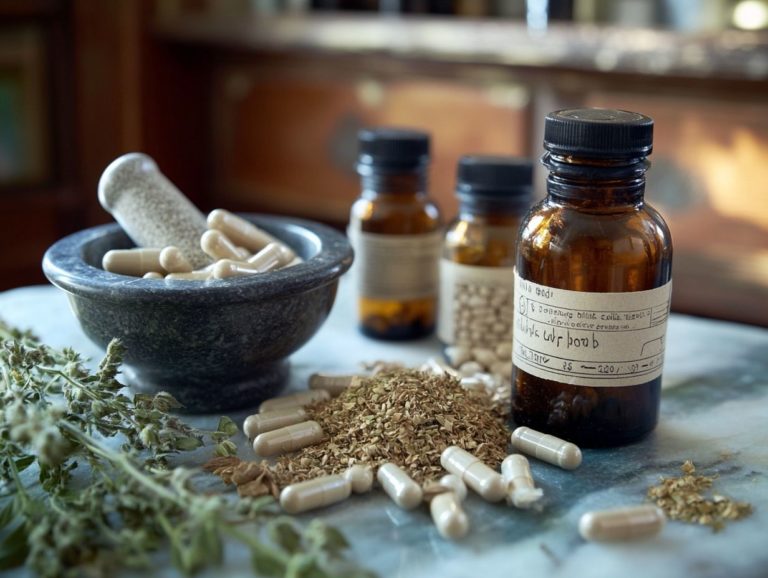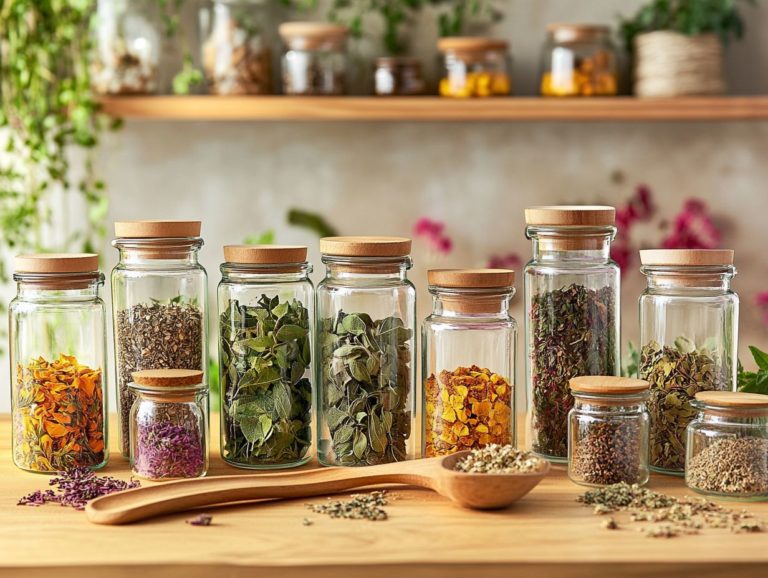5 Popular Misconceptions About Herbal Dosage
Herbal remedies are gaining traction, yet misconceptions about their safe use and effective dosages continue to linger.
Many believe that all herbs are safe and can be taken in large amounts. This misconception is often fueled by health marketing.
This article delves into five common myths regarding herbal dosages. We’ll reveal what they actually mean and examine the factors that determine how much you should take. Grasping these principles is essential for ensuring both safety and efficacy in your use of herbs.
Join in as we unravel these misconceptions and guide you toward responsible approaches to herbal practices.
Contents
- Key Takeaways:
- 1. All Herbs Are Safe and Can Be Taken in Large Amounts
- 2. Herbal Dosages Are Not Important
- 3. Herbal Dosages Are Universal
- 4. The More You Take, the Quicker the Results
- 5. Herbal Dosages Can Be Adjusted Based on Body Weight
- What Is Herbal Dosage and Why Is It Important?
- Frequently Asked Questions
- 1. What is considered a “normal” herbal dosage?
- 2. Can I take larger doses of herbal supplements for faster results?
- 3. Are all herbal supplements safe to take in any amount?
- 4. Do I need to increase my dosage as my body gets used to the herbal supplement?
- 5. Is it safe to mix different herbal supplements?
- 6. Can I stop taking an herbal supplement once I start feeling better?
Key Takeaways:

- Don’t assume all herbs are safe; some can be toxic in high doses, especially for those with chronic conditions.
- Herbal dosages are crucial for effectiveness and safety.
- Dosages vary based on the specific herb and individual factors.
1. All Herbs Are Safe and Can Be Taken in Large Amounts
The notion that all herbs are inherently safe and can be consumed in abundance is a common misconception. This can lead to health risks. Always consult qualified healthcare professionals, such as Katherine Grote, CRNP.
Take echinacea, a popular herbal variety, for example. It s widely chosen for boosting the immune system, but overdoing it can result in digestive issues or even allergic reactions. Similarly, indulging too much in St. John’s Wort can interfere with prescription medications, reducing their effectiveness and putting your health at risk.
It’s essential to understand that, despite their natural origins, some medicinal plants can exert powerful effects and come with potential side effects. Consulting healthcare professionals will provide you with personalized advice tailored to your specific health conditions and medications. Relying on reputable sources can clarify correct dosages and interactions, enabling you to navigate dietary supplements safely and effectively.
2. Herbal Dosages Are Not Important
Many individuals mistakenly underestimate the importance of herbal dosages. Precise dosing is essential in herbal medicine. It s vital for preventing health risks and achieving desired benefits through healthy eating.
This misunderstanding can lead to serious consequences, especially when people self-prescribe or follow unverified online health claims. Take St. John’s Wort, for example; it’s commonly used to alleviate symptoms of depression, but incorrect dosing can lead to negative interactions with other medications.
Understanding the right dosages is crucial not just to avoid nutritional deficiencies, but also to prevent adverse health conditions from improper use. Education and professional guidance are essential for anyone looking to safely incorporate herbal supplements into their health regimen. It’s important to know when to adjust your herbal dosage for optimal safety and effectiveness.
3. Herbal Dosages Are Universal
The idea that herbal dosages are one-size-fits-all is a myth. In reality, your individual health needs and any underlying conditions can dramatically influence what dosage is right for you.
For example, your age can be a significant factor. A senior citizen may find that lower doses of ginseng are more suitable than what a younger adult would require, as how our bodies process substances changes as we age.
Likewise, your weight plays a crucial role; if you re on the heavier side, you might need higher doses of herbs like saw palmetto to achieve the desired effects.
Pre-existing health conditions, such as liver issues, can necessitate careful adjustments in dosage, particularly for herbs like kava, which may place additional strain on the liver. Recognizing these nuances highlights the importance of a personalized approach in herbal medicine, ensuring that you receive tailored recommendations for safe and effective use.
4. The More You Take, the Quicker the Results

Many believe that taking more herbal supplements leads to quicker results. However, this misconception can pose serious health risks, especially for those with chronic conditions who must manage their diets carefully.
Overconsumption can actually diminish the benefits of these natural products. It often leads to unwanted side effects and increased health risks.
Your body can only process a limited amount of active compounds effectively. This highlights why consulting with a healthcare professional is critical.
Exceeding this threshold may overwhelm your system, resulting in complications like gastrointestinal distress or organ strain. For individuals managing chronic illnesses, excessive consumption can disrupt prescribed medications and create dangerous interactions.
Understanding the balance between dosage and efficacy is essential for anyone relying on herbal products for better health.
5. Herbal Dosages Can Be Adjusted Based on Body Weight
Adjusting herbal dosages based solely on body weight can be misleading. Individual metabolism, underlying health issues, and vitamin levels play vital roles in this equation.
How well your body absorbs certain herbs can vary from person to person. Factors such as metabolic rate and lifestyle choices influence this absorption.
This emphasizes the need to personalize herb-based treatments for your unique health profile. Relying only on body weight might lead to lackluster effects or unwanted side effects.
Consulting with healthcare professionals, including nutritionists, is crucial for evaluating your dietary needs. This ensures that your chosen dosage aligns with your overall health strategy for safe and effective herbal use.
What Is Herbal Dosage and Why Is It Important?
Herbal dosage is the specific amount of an herbal preparation you need to gain health benefits. This includes vitamins and antioxidants, and it’s a key part of dietary management and overall wellness.
Getting the dosage right is critical for safety and effectiveness in preventing disease. Different forms of herbal medicine like teas, tinctures, capsules, or powders each have unique characteristics that affect dosing.
For instance, a concentrated capsule might need a lower dose than a tea brewed from loose leaves. Individual factors such as age, weight, and health conditions are crucial in determining the right dosage.
This underscores the need for a nuanced approach when incorporating herbal remedies into your health regimen.
What Factors Affect Herbal Dosages?
Several factors influence herbal dosages, including health conditions, age, body weight, and dietary needs. It’s vital to consult with a healthcare professional before starting any herbal supplementation.
These variables impact how well your body absorbs and utilizes herbal remedies. Age significantly affects metabolism; older adults may require lower dosages due to slower metabolic rates.
Body weight also matters. Individuals with higher body weight might need greater dosages for the same therapeutic results as those who weigh less.
Your specific dietary needs, like food allergies or intolerances, can also interact with herbal supplements. These factors may necessitate dosage adjustments for safety and effectiveness.
Understanding these nuances helps tailor your herbal regimen to better fit your individual profile.
How Can One Determine the Right Dosage for a Specific Herb?

Determining the right dosage for a specific herb requires careful consideration of various factors. It’s crucial to consult health professionals and utilize evidence-based guidelines for effective dietary management.
This process often involves researching the herb’s traditional uses and understanding its active components. It’s also important to keep your individual health conditions, such as mental health or anxiety symptoms, in mind. Start by gathering information from reputable sources, such as the National Center for Complementary and Integrative Health, including medical journals and herbalist texts, which can provide valuable insights into the herb’s safety and efficacy.
Once you’ve compiled sufficient information, consult with a healthcare provider experienced in herbal medicine. They can evaluate your personal health needs, taking into account any allergies, current medications, and underlying health issues.
For example, common herbs like lavender might have an effective dosage of 1 to 2 teaspoons of dried flowers for calming effects. Meanwhile, echinacea is typically recommended at 300 to 500 mg of the root extract to support immune function. For older adults, it’s important to follow herbal remedies dosage tips to ensure safety, as each individual’s response can vary, so close monitoring and potential adjustments are advisable.
What Are the Risks of Taking Incorrect Herbal Dosages?
Incorrect herbal dosages can pose serious health risks, such as nutritional deficiencies and the worsening of chronic conditions. It’s crucial to pay attention to accurate dosing in herbal medicine.
When you self-prescribe herbal remedies without proper guidance, you might exceed safe limits, leading to adverse reactions. For instance, a patient who consumed excessive amounts of St. John’s Wort experienced negative interactions with prescribed medications, causing a dangerous spike in serotonin levels.
This example highlights the importance of consulting health professionals. They can provide personalized advice to ensure your safety and the effectiveness of your treatments. Regular consultations not only help mitigate risks but also enhance the overall therapeutic benefits you can achieve from herbal remedies.
Can Herbal Dosages Vary for Different Forms of the Same Herb?
Herbal dosages can vary significantly depending on the form of the herb you re using whether it s powders, extracts, or teas. This difference is key for effective dietary management and to optimize your health benefits.
Take turmeric, for example. In powdered form, you’re getting concentrated levels of curcumin, which means a smaller dosage can be just as effective as a larger amount found in tea, where the constituents are more diluted. On the other hand, herbal extracts, particularly in tincture form, can be absorbed more efficiently. Just a few drops can deliver potent results. Understanding herbal supplements and recommended dosages will help you tailor your dosages effectively.
If you’re using standardized extracts, follow the package recommendations. For those who prefer loose herbs in teas, you might need to use larger quantities to achieve similar effects. It’s all about adjusting based on your personal tolerance and the health outcomes you aim to achieve. To ensure accuracy in your herbal preparations, consider learning how to measure herbal dosages accurately.
What Are the Common Misconceptions About Herbal Dosages?
Common misconceptions about herbal dosages often arise from myths fueled by dubious health claims, which can lead to underestimating the risks of using herbal medicine improperly.
Misunderstandings can lead to serious consequences. You might overestimate the benefits or miss potential side effects that could harm your health.
It’s essential to recognize that not all herbs are created equal; their potency can vary significantly depending on preparation methods and individual health conditions. For optimal results, consider following herbal dosing best practices for efficacy.
By talking to trusted sources such as peer-reviewed studies or qualified health practitioners you can gain valuable insights into the safe and effective use of herbal remedies.
Educating yourself about accurate dosages, which refers to the amount of a substance you take, will enable you to make informed decisions. This allows you to enjoy the benefits while avoiding costly oversights.
Frequently Asked Questions

1. What is considered a “normal” herbal dosage?
The term “herbal dosage” can be misleading. There is no one set dose that applies to all herbal supplements.
Always check with a qualified herbalist or follow the recommended dosage instructions on the product label to determine the appropriate dosage for each individual supplement.
2. Can I take larger doses of herbal supplements for faster results?
Many people believe that taking larger doses of herbal supplements will give them faster and more effective results. However, this is not always the case and can even be harmful.
Don t risk your health always follow the recommended dosage guidelines to avoid potential side effects and ensure the best results.
3. Are all herbal supplements safe to take in any amount?
No, not all herbal supplements are safe to take in any amount. Some herbs can have toxic effects if taken in large doses or for extended periods of time.
It is important to research and consult with a healthcare professional before taking any herbal supplement to determine the appropriate dosage and potential risks.
4. Do I need to increase my dosage as my body gets used to the herbal supplement?
It is a common misconception that the body builds a tolerance to herbal supplements. In reality, the body does not develop a tolerance to herbal supplements.
Stick to the recommended dosage for the best results.
5. Is it safe to mix different herbal supplements?
Mixing different herbal supplements is not always safe and can even be dangerous. Certain herbs may interact with each other, causing adverse effects or decreasing the effectiveness of the supplements.
Always consult with a healthcare professional before combining different herbal supplements.
6. Can I stop taking an herbal supplement once I start feeling better?
It is important to follow the recommended dosage guidelines for the entire duration of the supplement, even if you start feeling better.
Stopping a supplement prematurely may lead to a relapse of symptoms or could prevent the supplement from fully addressing the underlying issue. Always consult with a healthcare professional before stopping any herbal supplement.





